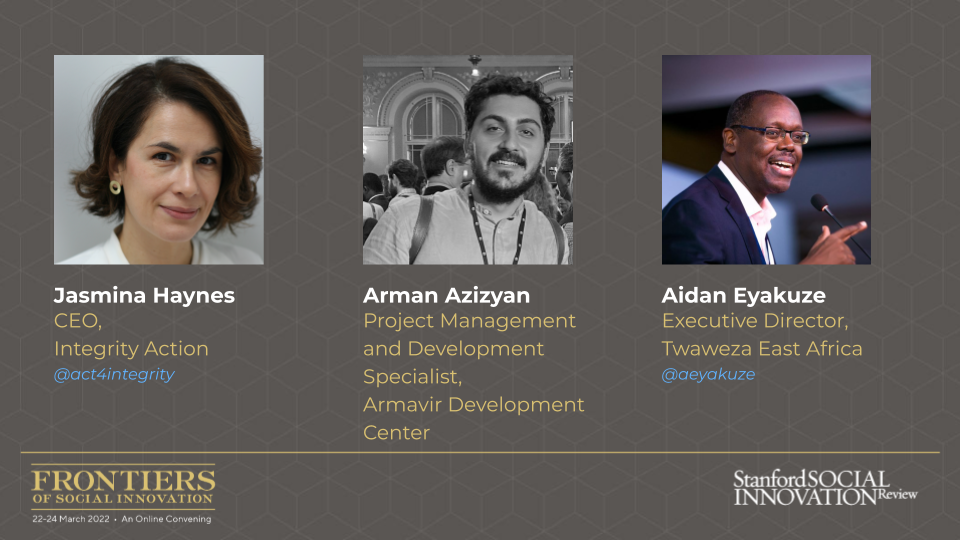SSIR Frontiers conference roundup: Trust between governments and citizens: the key to responsiveness?
This piece explores how we can ensure governments respond to the needs and requests of citizens, and how trust and power relate to this. It is based on our recent session at the SSIR conference.
When a contractor responsible for the community’s new classroom in Kenya asks a woman who is checking his work, “How did you get to be so powerful?” you know there’s a compelling story behind it.
We delved into how we can ensure governments respond to the needs and requests of citizens, and how trust and power relate to this, in a recent session at the Stanford Social Innovation Review Frontiers of Social Innovation conference. Integrity Action’s recent research had highlighted the importance of trust between citizens and government, who can together - under the right conditions - identify shared problems and collaborate on solutions. We wanted to show how this can work in practice, and what it takes to move from the traditional social contract to a more collaborative “social compact” where power is shared.
In the session, Integrity Action’s CEO Jasmina Haynes was joined by Arman Azizyan from Armavir Development Center (Armenia) and Aidan Eyakuze from Twaweza (East Africa). The discussion touched on a number of points, such as:
- Trust between individual citizens and duty bearers can help to get things done. When citizen monitors are engaged in getting problems solved, they need to identify which duty bearers are trustworthy and can support these efforts. In the example mentioned above, Jasmina described how in Kenya, citizens are teaming up with local government officials to put pressure on building contractors to do their jobs properly. Trust enables this collaboration to take place effectively. (Read the full case study here)
- Trust has implications for power relationships. In the Kenya case, contractors were surprised at how powerful a local woman acting as a citizen monitor had become. But it’s not just about “rebalancing” power - all three speakers highlighted how people who trust each other have the power to achieve more together.
- Trust can be built incrementally, building up to big impacts. Even if large problems can initially seem insurmountable, building up trust by first addressing smaller issues can create momentum. Aidan shared an example from Pangani District, Tanzania, where citizens were demanding a safe water supply but also wanted to get rid of a problematic local brothel, which they didn’t think the government would be able to do. By first engaging on the water issue and getting it fixed, trust was built to the point that the community felt they could then ask the government to address the issue of the brothel.
- Duty-bearers trusting citizens is just as important as the reverse. Arman shared an example from Vanadzor School in Armenia, where contractors and engineers did not trust regular, non-expert citizens to monitor construction of a $2.5 million earthquake resistant school. However, once they had seen that student monitors had identified important problems, like the lack of a safe footpath across the highway to reach their school, collaboration became easier (and those responsible changed the project plans to build a flyover crossing the highway). For collaboration to be effective, duty bearers must trust citizens as well as vice versa.
- Building trust helps you to address citizens’ priorities with longer-lasting solutions. As Aidan explained, when homeless citizens and the authorities in Austin, Texas started to collaborate, it was easier for the local government to understand which problems really mattered to the people without a permanent address. In this case, the government started providing a service for homeless people to keep their possessions dry and safe from theft. When you build trust, you are more likely to a) deal with the priorities of the citizens properly and b) reach a collaborative solution which lasts longer, because the people involved have a stake in making sure the solution lasts.
- It takes courage to build trust. Aidan said we must recognize that governments do not necessarily have solutions for all the complex problems that they face, so they must become humbler, learn to ask for advice, and also have the courage to co-create solutions with citizens. For instance, a governor in West Sumbawa, Indonesia, brings people together in a weekly forum for consultation, complaints and problem-solving: in this way, the local government listen with humility, with authenticity, but not necessarily with timidity. Governments themselves admitting that they do not have all the answers takes courage, and this can pave the way for trust to be built.
- Humility, trust and courage is needed by all of us working in social innovation, not just governments. Finally, Michael Voss of SSIR echoed what the speakers had shared, adding that the points about governments needing to be more humble, more courageous and to truly listen is something that many of us working in social innovation should take to heart - not just governments, but NGOs, nonprofit leaders and funders as well.
This is just the beginning of the discussion, not the end, so please reach out to us if you’d like to speak more about this or let us know what you think! info@integrityaction.org or tweet us on @Act4Integrity


